There are moments in life that split time into a before and an after – the second you realize the story you were building with someone isn’t what you believed. When a relationship is a lie, the ground seems to tilt, and ordinary things suddenly feel unfamiliar. You replay conversations, scrutinize memories, and search for the first thread that started to unravel. You are not overreacting. You are witnessing a truth, and while it stings, it also opens a door you can eventually walk through with steadier feet.
Why deception in love cuts so deeply
Romantic connection asks us to lean in. We offer trust, reveal history, share routines, and fold another life into our own. That willingness to be known is what makes love magnetic – and it’s precisely why a relationship is a lie can feel like a personal earthquake. The pain isn’t only about what happened; it’s about what was promised, implied, or gently suggested to be real. Our minds are wired to seek patterns and coherence. When the story shatters, your brain works overtime trying to reconcile the version you cherished with the version that now demands attention.
This is also why self-doubt often surges. You may wonder how you missed the signs, whether you misread kindness, or if you invited the harm. You didn’t. People can mask motives for a long time, especially when they stand to gain comfort, status, attention, shelter, or validation. When a relationship is a lie, the deceit can be woven into compliments, plans, or carefully staged vulnerability. It is upsetting because you invested real emotion into something that was presented as mutual.

Illusions that masquerade as love
Not every mismatch is malicious. Sometimes two decent people want different things and take too long to admit it. But there are also patterns that thrive on confusion. You might be with someone who performs intimacy – saying the right words, mirroring your interests, and echoing your values – yet avoids accountability when actions fall short. You might be showered with attention while kept just far enough from the parts of their life that would make the arrangement clear. When a relationship is a lie, ambiguity is not an accident; it is a tool that keeps you guessing and, therefore, compliant.
It helps to name what you’re experiencing. Labels are not cages; they are flashlights. If you can describe what’s happening, you can decide what to do next. The goal isn’t to diagnose your partner; it’s to protect your well-being. What follows are signals that often accompany the realization that a relationship is a lie, followed by concrete steps for regaining your footing.
Signals that the connection isn’t what it seems
A charming mask that slips under pressure. Early days can feel cinematic – attention, flattery, intense focus. Yet the warmth cools whenever you ask for clarity or boundaries. Apologies come wrapped in excuses, and promises arrive faster than change. If the version of them you fell for only appears when everything goes their way, you may be seeing how a relationship is a lie can be powered by performance rather than sincerity.

Affection tied to utility. You notice you’re most valued when you’re providing something: rides, introductions, cover, housing, money, labor, or image management. When your availability dips, so does their affection. If love feels contingent upon what you supply, a relationship is a lie is not a dramatic phrase – it’s a practical description of a dynamic that treats you like a resource instead of a person.
Repetition instead of repair. Everyone makes mistakes. The difference between stumble and pattern is what happens afterward. Genuine repair shows up as changed behavior over time. If the same betrayals keep cycling – secret messages, missing hours, shifting stories, broken boundaries – you are not required to keep issuing second chances. When apologies are plentiful but new harm arrives on schedule, a relationship is a lie because contrition is being used as camouflage.
Future-talk that never leaves the runway. Vacations are sketched, apartments are browsed, families are hypothetically met – yet the present never moves toward those plans. You live in a perpetual “soon.” When your timeline is quietly held hostage by tales of later, a relationship is a lie because time itself is the bait.

Foundations built on omissions. Maybe they said they were single but were actually “on a break.” Maybe they minimized kids, exes, debts, or living situations. The specifics vary, but the structure is the same: you were asked to commit without full context. When critical facts are withheld, a relationship is a lie at the root, and even tender moments cannot stabilize a cracked base.
Being kept offstage. You’re delightful in private but conspicuously absent in public. Friends never seem to be available, family gatherings remain hypothetical, and photos vanish before they can be posted. If you are treated like a secret, a relationship is a lie because the concealment serves someone else’s narrative more than your shared reality.
Gaslight fog. You bring up discrepancies and walk away feeling confused about your own memory. Jokes land at your expense when you try to advocate for yourself. The point of the conversation drifts until you’re apologizing for bringing it up. When truth is bent until you can’t recognize it, a relationship is a lie that is maintained by distortion.
What to do the moment the truth clicks
There is no single script for what comes next. Your safety, resources, and obligations shape what is possible. Still, there are reliable moves that help most people stabilize. The choice to stay, pause, or leave becomes clearer when you reclaim your center. When a relationship is a lie, action beats rumination – even tiny actions begin to restore your sense of agency.
Pause the blame spiral. Your first task is not to solve the entire situation; it is to lower the emotional temperature. Drink water, step outside, breathe slowly, write what you know. Self-criticism masquerades as productivity, but it rarely helps. You did not cause someone else’s dishonesty. Remind yourself of this whenever the thought returns: a relationship is a lie because of choices you did not control.
Document what matters. Jot down dates, statements, and events while they’re fresh. Save screenshots, emails, and messages in a private folder. This is not about building a courtroom case; it’s about creating clarity so you’re not debating a blur. When a relationship is a lie, written notes protect you from being talked out of your own experience.
Name your non-negotiables. Decide what conditions would need to be present for you to feel safe moving forward – transparency about communication, therapy, time apart, or a clean break. Your terms aren’t demands; they’re boundaries. If someone argues with the existence of your boundaries, you have your answer. In that moment, a relationship is a lie becomes more than a phrase – it’s a compass pointing you away from harm.
Have the direct conversation when it’s safe. If you choose to confront the issue, plan it. Pick a neutral space, clear an hour, and stick to observable facts. Keep one goal: clarity. You are not required to debate, defend, or convince. When a relationship is a lie, crisp sentences anchored in specifics help you stay grounded: “You said X. I discovered Y. That does not match.”
Recruit support. Talk to a trusted friend, counselor, or mentor who can hold your story without amplifying drama. Ask for practical help – a place to stay, company while you pack, or assistance sorting logistics. When you speak your truth aloud, the fog lifts. It becomes harder to minimize what happened, and easier to act. That’s crucial when a relationship is a lie and your confidence has been eroded.
Build a safety plan if needed. If your gut hints at volatility, prioritize safety. Share your location with someone you trust, arrange exits, and keep important documents accessible. You are not being paranoid; you are being prudent. In circumstances where control has been a theme, recognizing that a relationship is a lie can provoke pushback – planning keeps you safer.
Choose a path and commit to it for a set period. Whether you opt to end things, take a break, or explore repair, give yourself a defined window and clear markers of progress. For instance, “We will evaluate after thirty days of consistent behavior change.” Deadlines counter drift. Without them, a relationship is a lie can quietly reconstitute itself through inertia.
Repair, retreat, or release?
Some people do the hard work of earning trust back. Others ask for endless patience while repeating the same patterns. The difference is visible over time. If the deception was a single breach, acknowledgment is full, and change is sustained, repair may be possible. If you’re navigating serial betrays or core misrepresentations, release is often the healthiest route. When a relationship is a lie, “staying to prove you’re strong” is not strength – leaving a harmful arrangement is.
Consider how you feel in your body around them. Do you decompress or brace? Do you relax into the moment or scan for danger? Your nervous system is a sophisticated historian. It keeps score of what has been safe and what has not. If you consistently brace, a relationship is a lie has already taught your body to expect tremors; honor that information.
Rebuilding trust in yourself
One of the sneakiest outcomes of deception is the way it colonizes your self-image. You might start narrating yourself as “someone who can’t tell what’s real.” You can counter that story. Start small. Keep promises to yourself each day – drink the water, take the walk, send the email, make the bed. Consistency rewires confidence. When a relationship is a lie, your mission isn’t to become suspicious of everyone; it’s to become reliably on your own side.
Revisit your values. Write three words that describe the kind of love you want – perhaps “clear,” “steadfast,” “playful,” or “accountable.” Use those words as a lens. If an interaction doesn’t match, it’s information, not an indictment. Over time, you’ll notice you spend less energy decoding mixed signals because you’re anchored to what you already decided matters. That’s how you ensure a relationship is a lie does not become your identity.
Dating mindfully after a rupture
It’s tempting to swing to extremes – to swear off dating or to dive into distractions. There is a middle path. Move slowly on purpose. Let curiosity lead instead of projection. Ask follow-up questions. Observe how someone treats others, not only how they treat you. Watch for alignment between words and behavior. When something feels off, do not rush to explain it away. When a relationship is a lie, the earliest flags are often dismissed as “being picky.” In reality, discernment is kindness to your future.
Mindful dating also means pacing the intimacy you share. You can be open without oversharing. You can be warm without overcommitting. It’s okay to reserve long-term promises until time has had a chance to show you who someone is. This is not cynicism; it’s stewardship. You learned the cost of believing too quickly. Let that tuition purchase wisdom – not walls.
If you are the one who concealed the truth
Sometimes the realization cuts both ways – you look in the mirror and recognize where you minimized, omitted, or shaped reality to keep a connection. Accountability is a gift you can give yourself and others. Name what you did without qualifiers, apologize without bargaining, and change without advertising it. If the other person ends the relationship, accept the consequence. When a relationship is a lie, repair begins with unambiguous ownership, not self-punishment that centers you again.
Letting go without losing hope
Grief will arrive in waves. You will miss the person and also the future you imagined. That’s normal. You can mourn a dream while being relieved you stepped away from a fantasy. Rituals help – returning belongings, clearing photos, writing letters you never send, reclaiming your spaces. Each small act teaches your nervous system that life continues. Over time, the story softens. The day will come when you describe what happened without flinching. On that day, “a relationship is a lie” will be a chapter heading, not the plot.
Hope is not naïve; it’s strategic. It gives you a reason to heal properly so you don’t hand your next partner the bill for someone else’s choices. Love will still require courage. You will still risk. The difference is that you will carry the memory of what you honor in yourself. When respect is the minimum and not the reward, you will not settle for situations that ask you to shrink. When a relationship is a lie, the clearest antidote is a life rooted in your own truth.
Practical reminders you can return to
Your intuition is data. Treat it as a starting point for questions, not a verdict you must ignore. When a sensation persists, investigate it with compassion.
Consistency is evidence. Give behavior enough time to reveal itself before granting deep access to your time, finances, or home.
Boundaries are not accusations. They’re the structure that allows closeness to feel safe. If someone treats your limits as an insult, you have learned something invaluable.
Silence can be strategic. You don’t have to announce every insight or every plan. Choose where to place your energy – some conversations are designed to drain you.
Community is medicine. Let friendship, family, mentors, and, if available, professional support be scaffolding while you rebuild.
When staying is no longer on the table
Endings are rarely neat. There may be leases, pets, routines, and overlapping friendships. Treat the separation like a project: list tasks, assign dates, and enlist help. If you share housing, schedule a graceful exit with witnesses if needed. If you share finances, disentangle with documentation. Protect your digital life – change passwords, remove shared devices, and back up what you need. It might feel procedural, but procedure is peace. When a relationship is a lie, logistics handled with care reduce opportunities for more harm.
Expect a wobble after the break. The urge to re-engage can be strong, especially in quiet moments. Prepare for that, not by shaming yourself, but by scripting responses in advance. “I’m not available for this conversation.” “I wish you well and need space.” Save them as notes and texts you can send without thinking. These small supports keep you aligned when emotion surges. Each time you honor your decision, you strengthen the muscle that will carry you forward.
Seeing love without rose-colored lenses
It would be wonderful to have a device that reads intentions at first glance – but relationships are built in real time, not predicted with certainty. The best you can do is meet people with open eyes, curious questions, and respectful pace. Hold people to the standard of showing up consistently, not perfectly. Offer grace without abandoning discernment. When a relationship is a lie, it doesn’t mean all love stories are illusions; it means this one demanded a costly lesson you will not forget.
There will be mornings when you wake and breathe easier. You will catch yourself laughing and realize it’s been a while since you measured every word. You will notice that music sounds like itself again. That’s how healing introduces itself – quietly, then all at once. One day you will meet someone whose actions keep promising what their words say. You will feel your shoulders drop. You will be able to receive care without calculating risk. And you’ll remember the version of you who decided not to settle, who recognized when a relationship is a lie and chose a life aligned with truth.
Until then, keep choosing the smallest next right thing. Take the walk. Eat the meal. Text the friend. Say no when you mean no and yes when you mean yes. The rest will follow. And when you look back, you will see that confronting what was false gave you something priceless – a deeper loyalty to yourself. That loyalty will shape every room you enter, every boundary you set, and every love you allow. Even after a relationship is a lie, you are allowed a future that feels like daylight.
Remember this, gently and often: your ability to love was never the problem. Your willingness to learn is your superpower. Meet the next season with patience, with a bit of humor, and with the quiet assurance that you can trust yourself again. In that spacious trust, you’ll discover the kind of partnership where clarity is natural, delight is mutual, and the truth – not the performance – is what holds everything together. And that is how you move forward when a relationship is a lie.